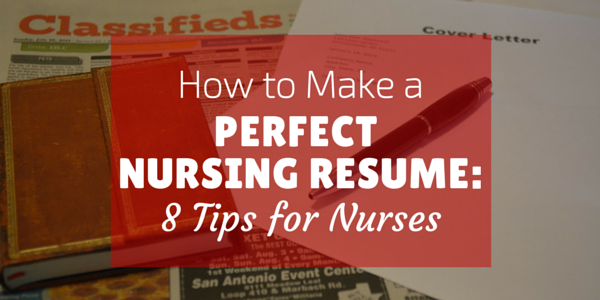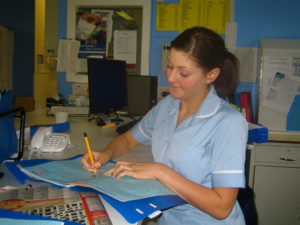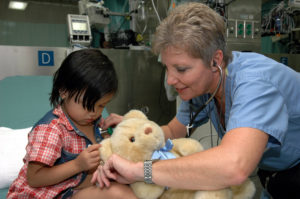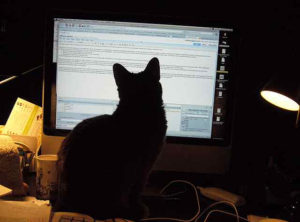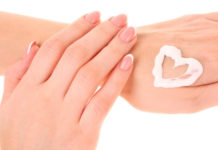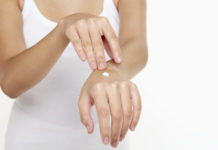When looking for your first job as a nurse, your nursing resume is the key in getting considered fit for the position. It should be appealing, complete yet concise with all the important details about your nursing career. If you want a guide on how to create an awesome resume for a nursing job you are eyeing, here are some practical tips you should consider:
1. Keep your resume short and straight to the point.
With so many applicants to screen, employers have little time to evaluate each resume they receive. For this reason, you should ensure that your resume will grab the employers’ attention as soon as they look at it.
A one-page resume is recommended for entry-level nurses while seasoned nurses may have 2-3 pages of resume depending on the length of their work experience. Keep your descriptions between two to three sentences and make statements simple.
2. Create a career profile instead of job objectives.
It’s a smart move to create a career profile instead of job objectives. By using this instead, you can indicate why an employer should be interested in you.
A career profile is a short excerpt of your professional career as a nurse. Job objectives are considered part of old school resumes in the past, and employers nowadays prefer a short but concise career profile of potential candidates.
Also read: 10 Toughest Nursing Interview Questions (And Best Answers!)
3. Use keywords.
Agencies and human resource departments usually have lots of applications in line for a position. To systematize the process, they search their database of resumes through the help of keywords.
Knowing the right keywords and using them on your resume will help HR personnel find your own resume from their database. For nurses, “RN”, “registered nurse” or “staff nurse” are keywords frequently used by employers.
4. Specify your computer skills.
Hospitals and other healthcare facilities have transitioned to electronic medical records (EMR) system so computer skills are important qualifications for nursing applicants. Indicating your computer skills will give you an edge over those who don’t have the skills or those who neglect to include this in their resume.
If you have experience in using medical-related software, make sure to include it. List all the relevant software you know to use like Microsoft Office, Excel, and many more.
Also read: Nursing Apps: 9 Productivity Tools To Boost Your Job Satisfaction
5. Organize your work history in reverse chronological order.
Neat organization is the key in making a pleasant nursing resume. Your work experience or work history is usually the trickiest part to organize.
Most employers want to see the applicant’s work history arranged in reverse chronological order. This means that your most recent work experience should go first in the list and so on.
6. Add professional achievements.
Adding this little detail to your resume can make it stand out from the rest. At the bottom of your resume, add your professional achievements like published articles, position in nursing organizations, speaking engagements and other nursing related accomplishments.
Adding in your professional achievements will give you the chance to show that you have more skills to offer than just meeting the requirements of the vacant job. Employers will see this as potential keys for a promotion.
Also read: 15 Awesome Nurses You Should Follow On Pinterest
7. Create an identifiable name for your resume file.
When saving your resume file, it should include your name and date of submission. This way, employers can easily search for your resume in their files whenever they need it. Examples of proper identifiable resume file name are the following:
Smith, JW 05-25-2014
Smith, John _resume 05-25-2014
Smith, J 5-25-14
Take note that the surname goes first followed by other important details like initials or the first name and the date of the application. Employers usually remember the applicant’s surname if they appear promising for the job so it is best to start your resume’s file name with your last name.
8. Don’t forget to proofread.
Proofread your resume before you submit it. If possible, proofread it several times as you will not want a single typographical error to ruin your chances of getting hired.
Use standard fonts like Times New Roman, Arial or Helvetica. Use default margins and indentations. Follow ideal font sizes that run between sizes 10 to 12.
Lastly, if you feel confident enough with your resume, have someone you trust to read and evaluate it. Ask for suggestions if you need to revise it.
Other Considerations:
There are other important considerations in boosting your chances of getting hired.
An example is the importance of a cover letter. When submitting your nursing resume, don’t forget to include a properly addressed cover letter. It should spell out the name of the institution you are applying for including the name of the nurse manager if possible. Most HR or nurse managers discard applications without appropriate cover letters, so don’t take this for granted.
Also, it would be great to keep your professional resume online through the professional networking site LinkedIn. With the help of this social media site, you can showcase your professional resumes and/or bios online. You can explore a network of opportunities by connecting with your colleagues in this site. In return, other professionals may also connect with you. Some HR managers are looking for potential candidates for vacant positions through this site as they can readily see your edge in your chosen field with your listed resume profile.
And that’s how you create an awesome and effective nursing resume. Good luck with the job hunt!
About the Author: Je Abarra is a nurse by profession and a freelance writer by passion. She is working as a staff nurse in the pediatric ward of a private city hospital for more than two years. During her free time, she usually writes about her fascinations in health and nursing. She loves to provide tips and fun facts about nursing and healthy living.


